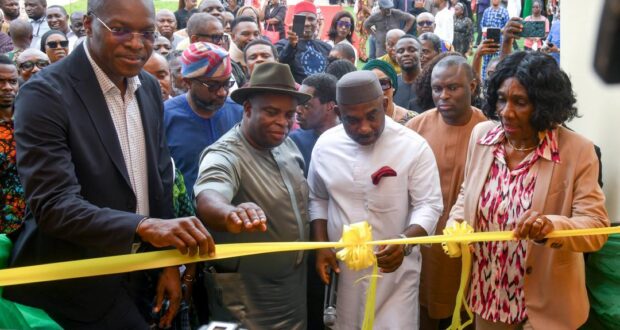The Nigerian Content Development and Monitoring Board (NCDMB) has highlighted the importance of engaging in research as a veritable tool to improve quality production and efficiency in the country’s oil and gas industry.
The Board also noted that pivotal to any meaningful sustainable initiative is funding, and as such the $50 million Nigerian Content Research & development fund was created in 2020 from the NCDF, and was designed to provide much-needed research funds in the Oil & Gas Research and Development (R&D) space” he said.

Therefore as part of efforts towards building an ecosystem for cutting-edge research, innovation and policy towards sustainable development, the Board on Monday announced plans to onboard more impactful research projects in the upcoming months in addition to the fourteen applied research projects it is presently sponsoring at various stages of technological readiness.
The Executive Secretary of NCDMB, Engr. Felix O. Ogbe, made the announcement during the opening ceremony of the 2024 Annual Triple Helix Nigeria Conference with the theme: “Integrating Research, Innovation, and Policy: The Triple Helix Pathway to Research Commercialization”.

Represented by Silas Omomehin Ajimijaye, the General Manager, Research and Development, Engr. Ogbe, called for collaboration among academia, industry, and government to foster innovation and economic growth, emphasizing the importance of integrating research, innovation, and policy for sustainable development.
“We intend to onboard more impactful research projects in the upcoming months in addition to the fourteen applied research projects that we presently sponsor at various stages of technological readiness.”
Ogbe noted that the conference theme is particularly apt stressing that creating an ecosystem where research, innovation and policy can interact has never been more critical as we steer Nigeria its course through the complexities of the 21st century.

According to the NCDMB boss, strategically, the Triple Helix model of academia, industry, and government collaboration is an appropriate international business framework for expressing these ideas about how research can be turned into new products and services.
“This model adds to our strength of innovation and ensures that all efforts go into fuelling National Development.Research and innovation represent the lifeblood of Nigeria’s oil and gas industry, as recognised by the Nigerian Content Development Monitoring Board (NCDMB)” he added.
In his remarks, Alh. Abdulmalik Halilu, President of Triple Helix Nigeria, emphasized the importance of integrating research, innovation, and policy for effective research commercialization, highlighting Nigeria’s impressive growth in patent applications, signaling the potential for universities to transform into entrepreneurial hubs.
Halilu expressed optimism about the future of innovation in Nigeria and Africa through the Triple Helix model, adding that the conference aims to foster collaboration among academia, industry, and government, featuring keynote speeches, panel discussions, and workshops designed to bridge gaps in research application.
“Today, we stand at the crossroads of science, technology, and business, united by the goal of driving forward innovation and economic growth. Our expectation is that this conference serves as a testament to the power of the Triple Helix model, where academia, industry, and government come together to set the agenda for solution based research culture in Africa. We are here to ignite fresh conversations, build lasting partnerships, and create a brighter future through the fusion of knowledge and enterprise” he said.
In her welcome address from Prof. Eucharia Oluchi Nwaichi, the Chairperson, Conference Planning Committee, emphasized the significance of collaboration among academia, industry, and government.
She highlighted that 156 authors submitted 47 papers, showcasing diverse contributions from across Nigeria, particularly from the South-South region.
Prof. Nwaichi expressed gratitude to speakers and sponsors, urging attendees to engage actively in discussions that could shape Nigeria’s innovation landscape for a sustainable future.
NNPCL To Direct Gas Supply To CNG, LPG Off-Takers From New Facility
As part of synergy with private sector partners to deliver more gas across regions, the Nigeria National Petroleum Company Limited (NNPCL) in collaboration with a local downstream player is set to build a natural gas distribution facility with a capacity of 100 million cubic feet a day (MMcfd).
The facility would be located Kogi State in Nigeria’s North Central region.
“The gas facility (city-gate) will enable natural gas supply to various domestic LNG facilities, CNG [compressed natural gas] compression and other facilities requiring gas in the Ajaokuta area”, NNPC, which entered into the agreement through NNPC Gas Marketing Ltd. (NGML), said in a statement.
Concurrently, NGML inked another agreement with the project partner, A4E Energy, to supply the latter five MMcfd over 10 years. A4E Energy, which according to NNPC is a homegrown midstream and downstream gas and renewable energy company, will use this gas in its CNG facility and CNG dispensing stations.
The NNPCL is expanding its gas infrastructure to grow both its domestic and overseas reach in the sector. Nigeria’s 2020–30 Decade of Gas initiative aims to make gas the top fuel of the country’s economic development.
Late last year the Company, local energy engineering company UTM Offshore Ltd. and the Delta government sealed an agreement for the construction of the West African country’s first floating LNG plant, as announced by UTM Offshore December 2023.
The project, which will exploit the offshore Yoho field, has a planned capacity of 176 MMcfd, according to UTM Offshore.
This year NNPCL signed a project development agreement with Golar LNG Ltd. for the deployment of an FLGN facility in Nigeria.
The deal with Bermuda-based Golar LNG “also outlines the monetization plan that will utilize approximately 400-500mmscf/d [million standard cubic feet per day] and produce LNG, LPG [liquefied petroleum gas] and Condensate”, NNPC said in a statement June 2024.
The FLNG will exploit “vast” proven gas reserves in shallow waters of the Niger Delta, NNPC said. The partners plan to reach a final investment decision by the fourth quarter. The start of production is planned for 2027.
NNPC, which exports LNG to Asia and Europe, recently held talks with a South Korean consortium toward a potential agreement to export Nigerian LNG to South Korea.
“South Korea is a major destination for Liquefied Natural Gas exports and the consortium, in collaboration with the Korean Export-Import Bank, has expressed interest in advancing discussions on investing in greenfield and other gas development opportunities, NNPC said January 2024.
“The talks will pave way for the execution of a Memorandum of Understanding that will unlock strategic foreign direct investment in line with the President Bola Ahmed Tinubu administration’s policy of making Nigeria a prime destination for global investors”.
At home, NNPCL plans to build three LNG fueling stations, and expects to have over 100 CNG stations by next year, as announced by NNPC Retail Ltd. managing director Huub Stokman last July.
“CNG provides Nigeria with affordable alternatives to existing available fuel products”, Stokman said, as quoted in an NNPCL press release. “It will be about 40 percent cheaper than petrol in Nigeria and with continued investments, it will become a significant part of our energy mix”.
Natural gas production in Nigeria has grown 0.3 per cent annually in the decade to 2022, with output that year at 40.4 billion cubic meters (1.4 trillion cubic feet), according to the Energy Institute’s 2024 Statistical Review of World Energy.
Associated and non-associated gas reserves in Nigeria stood at 209.3 trillion cubic feet as of the start of 2024, according to a report by the Nigerian Upstream Petroleum Regulatory Commission April 2024.
 Financial Energy Review
Financial Energy Review





